 |
| |
|
|
|
|
|

|
|
Playhouse 90
Rod Taylor appeared in five productions of "Playhouse 90,"
which is widely regarded as the most ambitious of TV's dramatic anthology
series.
"Playhouse 90" presented a
90-minute live drama each week, and is considered the epitome of the "Golden
Age" of TV. "Playhouse 90" drew top talent and was a launching pad for young
performers and directors.
According to
an AVClub.com retrospective, "Each show had an unprecedented 16 days of prep
time (12 in a rehearsal hall, then four in front of the cameras). The luxury of
rehearsal meant that directors could choreograph tremendously complex movements
for the cameras and the actors -- and that complexity meant that things could go
spectacularly wrong."
I've seen the five episodes that featured Rod Taylor, thanks
to the Museum of Television and Radio in New York City (now called the Paley
Center for Media) and UCLA's Film and Television Archive. The shows are indeed quality productions -- employing
first-rate acting, writing and directing talent, and challenging viewers with
complex themes.
Taylor has a pivotal role the first three shows I saw: "The
Great Gatsby," "The Long March" and "The Raider." He plays the man of good
character who must wrestle with troubling circumstances and serve as the
audience's guide to sorting out right and wrong.
Following are his five "Playhouse 90" appearances, in
chronological order:
|
|
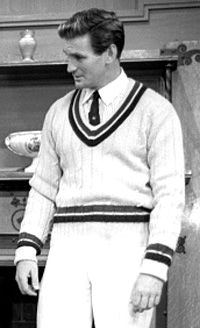
Rod as Nick Caraway
in The Great Gatsby.
|
LINKS |
|
IMDb -
Verdict of Three
IMDb - The
Great Gatsby
IMDb - The
Long March
IMDb - The
Raider
IMDb
- Misalliance
|
|
|
|
|
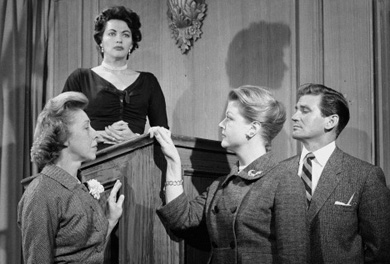 VERDICT OF THREE
Episode 2.32 (April 24, 1958)
Rod Taylor played Francis Allen, one of three jurors
referenced in the title of the episode, which was directed by the highly respected Buzz Kulik.
A United Press International review described the
production:
-
It was one of those very English things about a mother
accused of murdering her little boy so she could get her mitts on his
inheritance.
The concern of "Verdict of Three" was not only the trial of the mother, but
also the personal entanglements of three members of the jury. Through
flashbacks, the drama showed how each of the trio related portions of the
courtroom testimony to his own life and ultimately, to a decision to find
the mother guilty.
A weird little trio they were, too. One had bumped off her aunt for money,
another had seen her husband beaten to death by hoodlums and had her marbles
juggled by the event, the third was
a 28-year-old boy who sponged off his mother.
To a great extent, it was just too much for a 90-minute show to chew. The
development of the characters of the jurors was, of necessity, kind of
skimpy and the relationship between the mother and her attorney was a little
hazy.
Yvonne De Carlo as the mother turned in a pretty crisp job and so did Carmen
Mathews, Angela Lansbury and Rod Taylor as the jurors. Michael Wilding
played the defense attorney. Cecil Kellaway, an old pro, walked away with
acting honors for the evening in a bit role.
Los Angeles Times reviewer Cecil Smith praised the
performances of the three jurors in an April 28, 1958, column:
-
"Playhouse 90" offered an English courtroom
drama, "Verdict of Three," that was chiefly interesting because
of a series of marvelous performances. The play ... used the
clever device of tangling the lives of three jurors in the story
-- showing how twists in their lives rather than evidence
presented directed their verdicts.
It was rather a slap at the jury system --
particularly when these three cause the other jurors to agree
with them -- but it did offer a series of extraordinary
portraits created by Angela Lansbury, Carmen Mathews and Rod
Taylor as the jurors and Cecil Kellaway in a brilliant bit as a
doddering doctor witness.
|
|
|
|
|
|
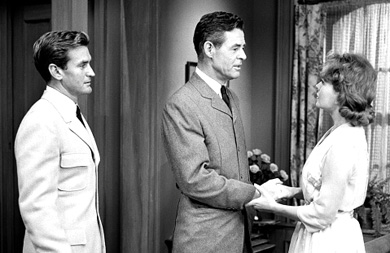
Rod Taylor, Robert Ryan and Jeanne Crain.
THE GREAT GATSBY
Episode 2.40 (June 26, 1958)
Rod Taylor played Nick Carraway in this adaptation of
F. Scott Fitzgerald's novel by screenwriter David Shaw.
Nick Carraway is the innocent bystander who gets drawn
into the complicated scandals of his wealthy neighbors for the summer:
his cousin, Daisy Buchanan (Jeanne Crain) and the mysterious Jay Gatsby (Robert Ryan). Virginia
Grey plays Myrtle Wilson, and Patricia Barry is Jordan Baker.
Of
the three "Playhouse 90" episodes I've viewed, this is the one that feels most like a
theater production. It was a live show, and there's a visceral quality to
the acting. In many scenes, you can see the perspiration pouring off the
actors.
Despite the live-theater feeling, the show features bold direction by Franklin Schaffner
and daring camera angles. Robert Ryan seemed awkward and miscast as
Gatsby, but Rod made a fine Nick Carraway. (Much like another
favorite actor, Sam Waterston, who filled that role in the 1974
movie with Robert Redford.)
A reviewer for the Des Moines Register, Ogden Dwight, had an astute observation about the
difficulty of adapting F. Scott Fitzgerald novels for the screen. "Their
nostalgic magic is created by and from written words, their order
and choice, and not from any plot on which they are arranged. In a
very real way, Fitzgerald defies translation."
Dwight praised the screenwriter, director, cast, sets and
costumes, but he felt all their work "availed naught" in the
face of Fitzgerald's complex work. Nevertheless, he did single
out Rod Taylor as "the outstanding performance of the entire cast."
|
|
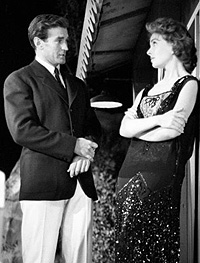
With Jeanne Crain in Gatsby.
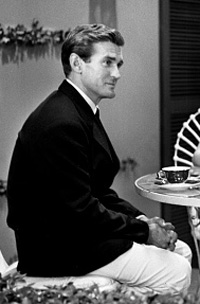
Rod in The Great Gatsby.
|
|
|
|
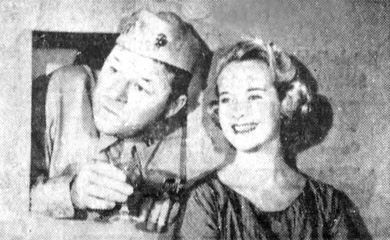
Jack Carson and Mona Freeman.
THE LONG MARCH
Episode 3.4 (Oct. 16, 1958)
Rod Taylor played Lt. Warren Culver, a Marine Corps reservist
called back to training for duty in Korea. Taylor gives a strong, smooth performance
in this production, which was directed by Delbert Mann. Roger O. Hirson
adapted the screenplay from a novel by William Styron.
Rod's Lt. Culver is established as a practical sort
of guy. On the personal side of his life, his girlfriend, Betty (Mona Freeman), wants
to get married, but he refuses, saying that he's been "in a war, out
of a war, into a job and out of a job, and back into another war."
That's not the type of foundation upon which he wants to start a marriage.
As a Marine, Culver is the capable assistant to his
good friend, Capt. Al Mannix (Jack Carson), a fellow reservist. Mannix's commander -- and nemesis -- is Col. Rocky Templeton
(Sterling Hayden), who has ordered the Marine trainees on a rigorous battle
exercise that's to be followed by a 36-mile march back to the base. Hayden's
Marine Col. Templeton runs things strictly by the book, and his iron
discipline gives rise to conflicts between himself and the reservists.
For Mannix, a burly man softened by his civilian desk
job, the long march ordered by Templeton becomes a personal crusade. At the
breaking point, Mannix ultimately defies
a sensible order by Templeton, and his defiant action leads to a loyal Marine
being mortally injured.
In the inquiry that follows, Rod's Lt. Culver is placed in the
uncomfortable position of having to support the facts of the case while
realizing that the facts hurt his friend. His emotional struggle continues
as he must deliver the bad news to the dying Marine's new bride, played by
Shirley Knight. In a final,
clarifying scene with Betty, Culver tries to sort out the meaning of what
happened, then grabs hold of one sure thing -- love (and marriage).
An Associated Press reviewer noted: "Rod Taylor
gave an outstanding performance as a lieutenant who understood both
soldiering and humanitarianism."
In a lengthy
interview
at the The Classic TV History Blog, Shirley Knight recalls
working with Rod Taylor in this episode:
-
We had a problem on
that. Jack Carson had been taking some sort of pills –
I think someone said later they were diet pills – and
when we actually were doing the show live, because he
just wasn’t quite all there, he cut half of a scene.
Which meant that some information wasn’t in, and also
meant that we were going to be running three or four
minutes short.
There was a scene later in the
show where Rod Taylor came to tell me that my
husband died, and so, very quickly, the writer and
director gave Rod Taylor something to say that was
some information that needed to be in the story. And
also, the director said to us, "You really need to
improvise until we cut you off."
So after he had said this information,
and after he told me my husband died, Rod Taylor and I
improvised. I was crying, and went on and on with my
sadness, basically. It was terrifying, but in a way it
was very exciting to mean that you were improvising
"Playhouse 90" in front of a lot of people out there,
and hoping that you did well. Afterward everyone was so
impressed and kind about what the two of us had done.
So we felt like we did well.
Jack Carson struggled with his lines throughout the
episode, as noted in a book about Playhouse 90's renowned producer, "The Man in
the Shadows: Fred Coe and the Golden Age of Television," by Jon Krampner. In the
first scene, Sterling Hayden poses a question during a classroom session, and
Carson's first line was supposed to be, "Sir, I'm not a student of tank
tactics." Screenwriter Roger Hirson admitted, "Well that was a mistake. Because
once he said, 'tank-tank-tac-ta,' we were off to the races."
This episode was technologically interesting
because it combined live production as well as the first on-location
taping ever done for a network TV drama. This came about in an
effort to get realism into the scenes depicting the long march. The
cast and crew were taken into the Santa Monica Mountains for the
taping. "We were up on Mulholland Drive, worrying about whether
there were rattlesnakes," Adri Butler, the show's script supervisor,
recalled in the Fred Coe book.
|
|
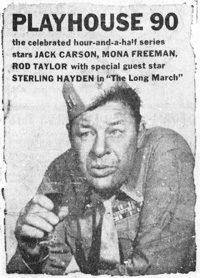
An ad for "The Long March"
featuring Jack Carson.
|
|
|
|
THE RAIDER
Episode 3.20 (Feb. 19, 1959)
Rod Taylor played Bob Castillo, a member of the board
of directors of the Harman Corp., a company that's the target of a corporate
raider.
He's one of the players in a high-stakes game between
the raider, David Ringler (Paul Douglas) and the chairman of the board,
Arthur Hennicut (Frank Lovejoy). But Castillo is different from the other
businessmen on the board: He's also a brilliant engineer from the research
and development department. As the power struggle mounts, Castillo is pressured
to rush an experimental engine through to production -- a desperate move
by Hennicut to shore up the board's stockholder support.
Although it deals with corporate intrigue rather than
military action, the themes in "The Raider" are similar to "The
Long March" -- loyalty, hard work and men driven by circumstances
past the point of being able to tell who's right and who's wrong.
Taylor,
as Castillo, helps the audience try to sort it all out. Castillo grows
in stature and awareness from the opening scene -- where he's considered
something of a yes-man -- to a climactic scene in Act 2 in which a virile,
angry (and open-shirted) Castillo challenges Hennicut over compromising
the integrity of the company and its employees.
The show concludes with the stockholders' vote unresolved,
but rather than being unsatisfying, the ending produces a jolt, leaving
the viewer with abundant material for discussion and deep appreciation
of the magnificent performances and well-crafted characters.
This episode was an original teleplay written by Loring
Mandel. Like "The Great Gatsby," it was directed
by Franklin J. Schaffner, whose later film credits include "Papillon,"
"Planet of the Apes" and an Academy Award for "Patton."
The show also marks the television debut of
cinema pioneer, actor, director and Oscar winner Donald Crisp at age
78. His comments to Associated Press columnist Bob Thomas
illustrate the challenges that actors faced on the show:
-
Being new to the medium, I guessed it would
be like doing films. So I took my script and went home and
memorized the whole thing. ... When I got to the first
rehearsals, they told me to forget the first script --
everything had been changed! Now I've been getting new pages of
dialogue every day, so I don't know whether I'm coming or going.
|
|
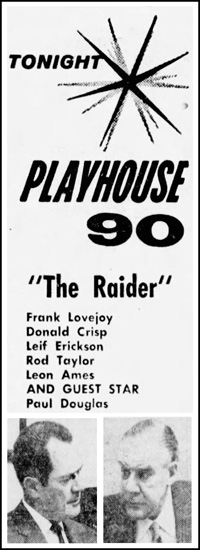 |
|
|
|
|
|
|
|
|
|
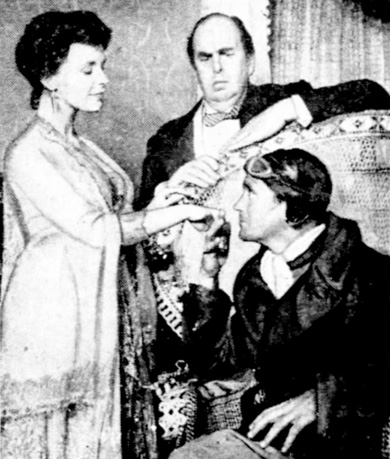
Claire Bloom, Robert Morley
and Rod in "Misalliance."
MISALLIANCE
Episode 4.3 (Oct. 29, 1959)
Rod Taylor played aviator Joey Percival in a
star-studded cast that
included Claire Bloom, Robert
Morley, Siobhan McKenna and Patrick Macnee. There was powerhouse talent behind the
camera, too, with John Houseman producing and Robert Stevens
directing. Costumes were by Oscar winner Dorothy Jeakins.
"Misalliance" is a play by George Bernard Shaw's play that was adapted for
"Playhouse 90" by Meade Roberts. Shaw's play posed many challenged in its
adaptation for TV. One was the play's sheer length. Another was its
fast-paced, overlapping dialogue. Some scenes have as many as nine people
talking at once.
"The playing time on the stage is over three
hours," producer John Houseman explained in a Washington Post
interview Oct. 29, 1959. "We have to put it into
six acts that will run 68 or 69 television minutes. However,
'Misalliance' is more suited to TV than any of Shaw's plays. We cut
out most of the first act -- which is mostly argumentative -- and sort
of played it straight from there. We compressed the first 45 pages
into about four minutes."
A UPI
reviewer gushed about the result:
-
It was time for a talk-talk-talk show on Playhouse 90 Thursday night.
And rousing good talk it was, too.
George Bernard Shaw's high-speed, high-penetrating comic romp,
"Misalliance," was run off in a delicious style on CBS-TV by a
clever cast ...
Robert Stevens' direction provided a stimulating pace. He clicked it off as
quickly as a Sgt. Bilko show — highest praise for this sort of show when
done on TV. At times the speed threw Morely for a loss, but nevertheless,
his verbal blurrings were minor compared to the spirit he displayed for his
part. Close-ups were superb and the camera's movement heightened the airy
atmosphere.
Houseman explained that "Shaw's play represents
the epitome of high comedy -- something that is rarely done on
television. ... This is a comic romp in which the playwright also
examines the morals, the mores of the characters. ... I think Shaw
would have liked having this comedy on television. He would have
liked being able to scold so many people at one time."
One reviewer noted that "the plot defies quick synopsis and
actually isn't important. It's the characters and the performance by the
cast that makes Shaw so stimulating."
But let's tackle a bit of plot: During the play, adventure
literally drops into the lives of an upper-crust family at an English country
estate when two parachutists plunge into the greenhouse. Rod played the pilot,
Joey Percival, and Irish actress Siobhan McKenna played his passenger, a Polish
acrobat named Lina Szczepanowska. These two become the focus of the romantic
intrigue that follows.
It was the first west-coast TV appearance for McKenna, as
well as for castmates Robert Morley (who had the principal role of John
Tartleton) and Claire Bloom (who played his daughter, Hypatia). Patrick Macnee
played Johnny Tarleton, Hypatia's brother.
The play wraps up with Tartleton agreeing to let his
daughter marry the pilot, and Lina flies off with Hypatia's former fiance.
Reviewers found it to be a "rollicking comedy, bristling
with ideas" and "slapstick alternating with wit."
|
|
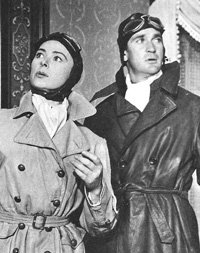
Rod with Siobhan McKenna
in Misalliance.
|
|
|
|
|
|
|
| |
|
|
|
|
| |
|
www.rodtaylorsite.com |
|
|
| |
|
|
|
|
|